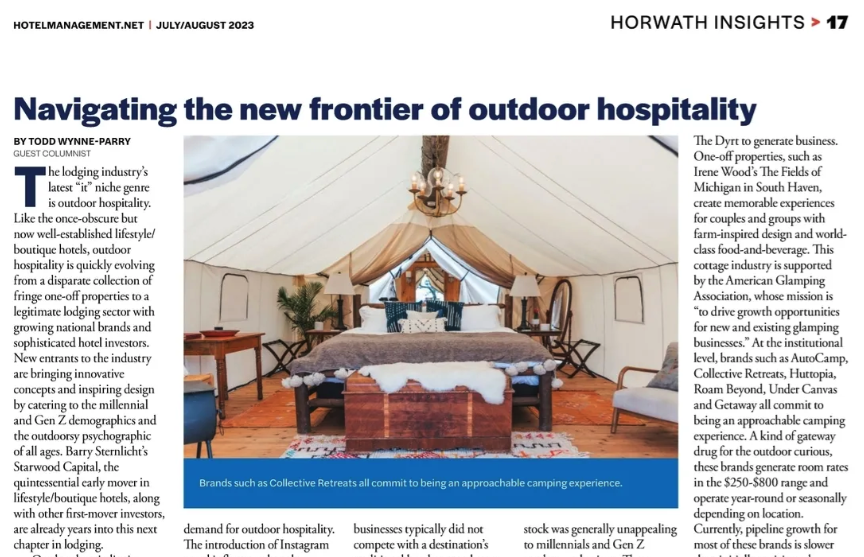
Trading Places – the challenges and opportunities of hotel and other real estate conversions
Date: April 13, 2023
Horwath HTL UK were delighted to welcome hospitality industry leaders to Crowe’s London office on Tuesday 24 January 2023.
Participants discussed their experience of ownership, finance, operations, law and accountancy in the sector and provided unique insights on the rationale and opportunities around conversions of existing real estate to hotel and alternative uses.
To set the scene Caroline Fleet, Head of Crowe Real Estate, provided an update on tax changes on the horizon addressing the potential impact of below.
- Corporation tax increase from 19% to 25% except for small companies.
- Super deduction capital allowances ending from 31 March 2023.
- End of the temporary loss carry back to three years – From 1 April 2022, only one year.
- Income tax changes – freezing of allowances, reduction in higher rate band (£150,000 – £125,140).
- Capital gains tax – Threshold £6,000 (FY23/24) and £3,000 (FY24/25).
- Reduction of SDLT threshold £250,000 – £125,000 and FTB allowance £300,000 – £425,000 now only temporary to March 2025.
In addition to the pressure of increasing taxation, according to Crowe’s Spaces and Places Outlook Report, despite best intentions, government regulation is considered to be the major barrier to delivering commercially viable conversions.
It is clear that, despite strong trading performance in 2022 and optimistic 2023 RevPAR forecasts, higher taxes, rising interest rates, inflation and regulatory changes (including around Sustainability) are weighing heavily on hotel real estate investment decisions. We asked participants if they thought the UK hotel industry was through the worst 29% answered that they are bracing for “worse yet to come” while more that half (53%) felt that it is “too soon to tell”. When we posed the same question at an event on 1 March 2022, 11% thought worse was yet to come, 47% thought too soon to tell and “42% felt it would be all good from here”. On balance, then, it seems that participants are more pessimistic today than early in 2022.
This uncertainly is also reflected in views of future value of hotels. Delegates were quite evenly split on whether average hotel values are likely to rise of fall over the coming year.
In light of ongoing uncertainty and global economic challenges, hospitality stakeholders are having to work hard to identify investment and growth opportunities in the sector. In the current market, conversions offer the potential to add significant value to underperforming and discounted properties. 75% of delegates expect conversions to form a larger part of their respective businesses going forward.
Indeed, from our research over the past year, major global operators are expecting 20 – 30% of their new signings to come through rebranding and conversions, and are introducing an ever-increasing number of flexible lifestyle brands to accommodate the unique re-imagined properties being delivered by innovative developers. Participants cited discounted pricing, speed to market and access to prime locations as key factors to pursue conversion deals while, in parallel, planning authorities increasingly favour re-use / conversion over demolition.
Investors and designers are typically focused on strategies to optimise efficiency in conversion schemes, often favouring limited service, serviced apartment and co-living schemes. Sustainability (ESG) measurement and performance is on the radar, but does not appear to be a key driver for conversion investment decisions in most cases. In general, converted and retro-fitted structures will not be as efficient as new build equivalents. The consensus view was that there are currently insufficient direct incentives for developers to choose the most energy efficient (and typically more expensive) technologies.
Concerns were expressed that, as regulations tighten, owners of non-compliant properties will find that their assets become unsaleable or heavily discounted. Delegates noted a clear difference in commercial viability between high value CBD locations and secondary locations. In secondary locations it is very hard to justify the expense of a complex retrofit compared to a more efficient new build structure.
Interestingly, despite increasing participation in conversion projects, these are not necessarily expected to deliver higher return that new build alternatives. A poll of delegates showed that 70% expect conversion projects to deliver similar or lower returns that comparable new builds.
Of course, every conversion project is unique and “the devil is in the detail.” One critical factor is to make the most of tax advantages available for conversions, something our delegates are clearly very aware of.
Stephen Metheringham, Crowe’s Capital Allowances Director, introduced some of the potential tax advantages associated with conversions (and other developments) with a focus on capital allowances, which summarises as follows. Expenditure applicable for capital allowances.
Property acquisitions:
- Seller owned pre-2008, potential unrestricted claims.
- Seller owned pre-2014, partial restricted claims.
- Acquisition post 2014, falls under pooling and fixed value requirements.
- Early due diligence essential to position buyer, draft contract clauses, identify unrestricted claims, robust and low election.
- Annual Investment Allowances (AIA) in year of acquisition.
Hotel construction, property conversion to hotel and refurbishment / fitting out:
- Identify and analyse expenditure for HMRC compliant yearly reports.
- AIA (and super deduction for pre-31 March 2023 expenditure) may be available yearly.
- Construction experience essential to fully maximise incidental works.
Land Remediation Relief – companies only and non-contaminator or long-term derelict land:
- Identify and detail compliant analysis and election in year of expenditure.
Property sale:
- Pre-marketing advice essential, to position sale to prevent tax clawback, robust and high election.
Capital allowances – Key takeaways
- Early specialist due diligence essential to position buyer in purchase process.
- Consider acquisition and continuance of trade post acquisition for acquisition claim prior to refurbishment.
Hotel construction, property conversion to hotel and refurbishment / fitting out:
- Where available, yearly analysis of expenditure to maximise AIA.
- Utilisation of existing structure and associated incidental works can reap higher tax relief on overall expenditure.
- Assess refurbishment programmes – consider eight year short life asset elections and planned programme.
Land Remediation Relief:
- Identify and detail compliant analysis and election in year of expenditure.
Property Sale:
- Early specialist advice to position sale to prevent tax clawback and retain capital allowances for future use.
Each acquisition, new build and refurbishment differs from property to property, it is essential to obtain property specific advice prior to the drafting of acquisition contract documentation, or on sale, prior to marketing.



